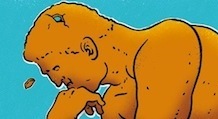 “Thinking, Fast and Slow” is a new book by Nobel laureate Daniel Kahneman about biases, shortcuts, and cognitive illusions that beset human thinking:
“Thinking, Fast and Slow” is a new book by Nobel laureate Daniel Kahneman about biases, shortcuts, and cognitive illusions that beset human thinking:
– Given $50, people react differently to a proposal that results in “losing $30” or “keeping $20” even though they are mathematically the same outcome.
– People feel more threatened by a disease that kills 1,286 of every 10,000 people versus one that kills 24.14% of the population, even though the latter is twice as fatal.
– People primed to think about money act more selfishly, picking up fewer dropped pencils than a non-primed subject.
– Even an oblique reference to old age results in people walking more slowly.
Basically, humans are NOT rational thinkers. To make good decisions we need to release the illusion of rationality, accept and understand our biases, and compensate.
– Framing: More people opt for surgery if told the “survival” rate is 90 percent, than when told the mortality rate is 10 percent.
– The sunk-cost fallacy: People wish to avoid regret; they continue to invest time and energy in failing outcomes rather than admit a mistake.
– Loss aversion: Most people choose to receive a sure $46 rather than take a 50% chance of making $100. A rational investor takes the bet, knowing the value of the bet is $50.
Closing quotes:
“Quick decisions are unsafe decisions.” — Sophocles, Greek playwright
“The trouble with most people is that they think with their hopes or fears or wishes rather than with their minds.” — Will Durant, Pulitzer Prize winning writer, best known for his 11 volume “The Story of Civilization”; 1885–1981
“Few people think more than two or three times a year; I have made an international reputation for myself by thinking once a week.” — George Bernard Shaw, British playwright


0 Comments